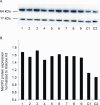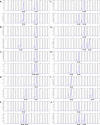Autism and other neuropsychiatric symptoms are prevalent in individuals with MeCP2 duplication syndrome
- PMID: 20035514
- PMCID: PMC2801873
- DOI: 10.1002/ana.21715
Autism and other neuropsychiatric symptoms are prevalent in individuals with MeCP2 duplication syndrome
Abstract
Objective: There have been no objective assessments to determine whether boys with MECP2 duplication have autism or whether female carriers manifest phenotypes. This study characterizes the clinical and neuropsychiatric phenotypes of affected boys and carrier females.
Methods: Eight families (9 males and 9 females) with MECP2 duplication participated. A detailed history, physical examination, electroencephalogram, developmental evaluation, Autism Diagnostic Observation Schedule, and Autism Diagnostic Interview-Revised were performed for each boy. Carrier females completed the Symptom Checklist-90-R, Wechsler Abbreviated Scale of Intelligence, Broad Autism Phenotype Questionnaire, and detailed medical and mental health histories. Size and gene content of each duplication were determined by array comparative genome hybridization. X-chromosome inactivation patterns were analyzed using leukocyte DNA. MECP2 and IRAK1 RNA levels were quantified from lymphoblast cell lines, and western blots were performed to assess MeCP2 protein levels.
Results: All of the boys demonstrated mental retardation and autism. Poor expressive language, gaze avoidance, repetitive behaviors, anxiety, and atypical socialization were prevalent. Female carriers had psychiatric symptoms, including generalized anxiety, depression, and compulsions that preceded the birth of their children. The majority exhibited features of the broad autism phenotype and had higher nonverbal compared to verbal reasoning skills.
Interpretation: Autism is a defining feature of the MECP2 duplication syndrome in boys. Females manifest phenotypes despite 100% skewing of X-inactivation and normal MECP2 RNA levels in peripheral blood. Analysis of the duplication size, MECP2 and IRAK1 RNA levels, and MeCP2 protein levels revealed that most of the traits in affected boys are likely due to the genomic region spanning of MECP2 and IRAK1. The phenotypes observed in carrier females may be secondary to tissue-specific dosage alterations and require further study. Ann Neurol 2009;66:771-782.
Figures





References
-
- Amir RE, Van den Veyver IB, Wan M, et al. Rett syndrome is caused by mutations in X-linked MECP2, encoding methyl-CpG-binding protein 2. Nature genetics. 1999;23:185–188. - PubMed
-
- Moretti P, Zoghbi HY. MeCP2 dysfunction in Rett syndrome and related disorders. Current opinion in genetics & development. 2006;16:276–281. - PubMed
-
- Carney RM, Wolpert CM, Ravan SA, et al. Identification of MeCP2 mutations in a series of females with autistic disorder. Pediatric neurology. 2003;28:205–211. - PubMed
-
- Couvert P, Bienvenu T, Aquaviva C, et al. MECP2 is highly mutated in X-linked mental retardation. Hum Mol Genet. 2001;10:941–946. - PubMed
Publication types
MeSH terms
Substances
Grants and funding
LinkOut - more resources
Full Text Sources
Other Literature Sources
Medical
Molecular Biology Databases

